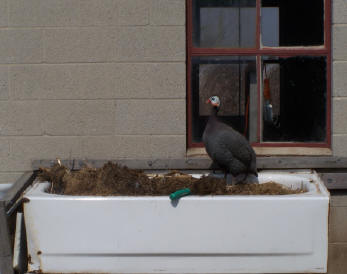Why start a worm bin?
 Worms recycle kitchen scraps into high quality fertilizer. A worm bin, well maintained, takes up
little room, smells less than a cat litter box, reduces and recycles your household waste and involves you and your whole family in the restorative cycle of nature.
Worms recycle kitchen scraps into high quality fertilizer. A worm bin, well maintained, takes up
little room, smells less than a cat litter box, reduces and recycles your household waste and involves you and your whole family in the restorative cycle of nature.
I have three full-sized bathtubs full of worms at White Rose Farm. When I need fertilizer for my gardens, I pour water through the tubs and collect what comes out the
drain. Hugh Lovel, a biodynamic farm consultant, recommended this liquid, known as worm exudate, as a premier natural fertilizer. It is free, rich in nutrients, well balanced
and complex.
Another friend has had a sherbet-sized tub of worms on her kitchen counter all winter. She has fed the worms with kitchen scraps and watched enthralled as tiny baby
worms-each smaller than a grain of rice--begin to wiggle.
In her book, Worms Eat My Garbage, Mary Appelhof provides a straightforward guide to setting up worm bins. She recommends that one build or buy a worm bin based on how
much food one wants to recycle every week. Track how much kitchen waste your family generates in a week and then plan on one square foot of worm-bin surface for each pound of
garbage.
She recommends red wiggler worms because they eat a lot of garbage, reproduce quickly and do not mind being disturbed every week. They are readily available by mail order
and often those who already have worms are happy to share their wealth with others. A friend shared a quart-sized freezer bag full with me last February. I gave her some in
August and now we both have plenty.
Red wigglers are surface feeders and will gradually work their way up through your kitchen scraps. Their habits are markedly different than worms active in the soil in
this area. Those worms burrow deeply, come to the surface at night and do not like being disturbed. They may be great for fishing, but not for worm bins.
Red wigglers need a container with ventilation, a moist bedding material, food, and moderate temperature. Most people pick a place that is close to their kitchen but
somewhat out of the way-a porch, a garage, a basement or a balcony for apartment dwellers. It helps to have a place where minor odors won't be overwhelming and where
harvesting the final compost will not create undue mess.
For bedding material, one can use old newspapers torn into strips or shredded paper. Appelhof recommends adding meat waste and bones judiciously or not at all to reduce
foul odors and to prevent attracting flies, mice, ants or rats. Do not add pet feces, she states firmly, and if you add rubber bands or other nonbiodegradable materials, plan
to see them even as everything else in the bin breaks down.
Most people collect their kitchen waste in a bucket or bag-it is important to have it ventilated--and then add the scraps once or twice a week. Do not add items high in
acid such as citrus all at once.
After several months, the worms will have transformed the kitchen waste into compost. The worms will begin to get smaller as they run out of food. It is time to empty the
worm bin and begin again. Use the compost in the garden, as a side dressing for houseplants, and give the gift of worms to a friend.
 At White Rose Farm, worms are one of the primary recyclers. I feed
them eggshells and coffee grounds in particular. I started the tubs last winter in a very mild February to see if they could live through the winter in the tubs. A friend had
said with a tub that size, the very core of the tub was not likely to freeze, and the worms might make it through the winter. They had no problem last year. By late fall, my
Guineas frequented the tubs and (I guess) enjoyed worms, worms, worms.
At White Rose Farm, worms are one of the primary recyclers. I feed
them eggshells and coffee grounds in particular. I started the tubs last winter in a very mild February to see if they could live through the winter in the tubs. A friend had
said with a tub that size, the very core of the tub was not likely to freeze, and the worms might make it through the winter. They had no problem last year. By late fall, my
Guineas frequented the tubs and (I guess) enjoyed worms, worms, worms.
This winter, February was so bitterly cold that I despaired that the worm bins had frozen solid and that all the worms had died. This week, I saw my Guinea hen atop the
tubs and guessed that she had one again found her delicacy.
I was finally able to dig beneath the surface of the bin this week. I found hundreds of lively wriggling worms. My community of tiny soil workers had lived through the
winter and was back at work, as I too as off the sofa and back into the fields.